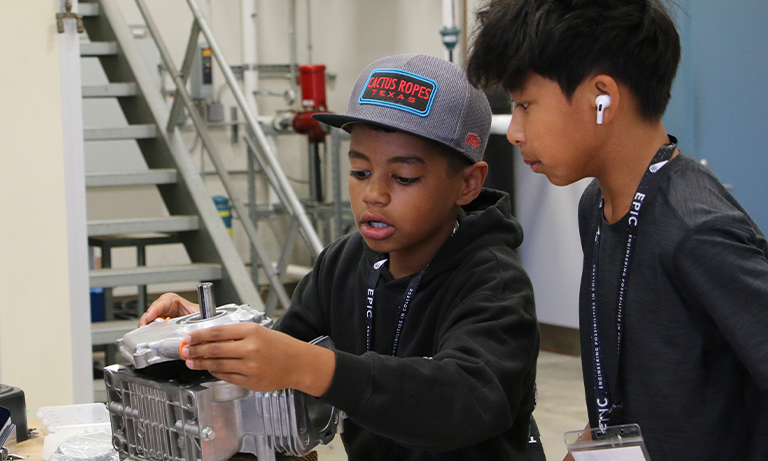Kenna Chase’s Rube Goldberg machine begins with a button that sends a tiny ball down a descending zig-zag of paper towel tubes attached to a box of Mini Wheats.
When the ball drops into a tiny Tupperware boat, it triggers a fan that blows it across a foil pan filled with water. As the boat reaches the opposite side of the pan, a sensor activates an LCD screen, which posts a message: Ahoy! The boat has arrived.
“I came in with more of a software background,” explains the Escondido resident, discussing her contraption. “But it was cool to interact with the hardware.”
Watching on a computer screen, Dennis Derickson, a professor in the Electrical Engineering Department, smiles and says, “Everything about this was delightful.”
Normally, Derickson would offer his feedback in person to students taking part in the Engineering Possibilities in College (EPIC) camp. But this year, due to the COVID-19 pandemic, the popular summer camp has gone virtual.
Still, that hasn’t slowed EPIC’s momentum. This year, EPIC received 730 applications for 413 spots, said Maria Manzano, EPIC’s program director.
“I definitely want to include another virtual option next summer even if we do go residential,” Manzano said.
The EPIC program strives to generate interest in engineering, especially among females, first-generation college-bound, and under-represented multicultural students. Normally, the EPIC students – both middle-school and high-school aged – stay on the Cal Poly campus to get a feel for residential life and the university experience. But this year, students “attended” from their homes, spread out across California and in states as far away as Illinois, Virginia and New Jersey.
“Due to the short notice of the virtual camp change, we did not admit out-of-the-country students and had to deny them,” Manzano said. “Getting them the lab materials in time was an issue.”
Those lab materials include kits that use Arduino, an open-sourced platform used to build electronics projects. Each student was sent the kit and used them to create Rube Goldberg machines during their daily engineering lab.

Rube Goldberg machines, named after the American cartoonist, engineer and inventor, are designed to perform simple tasks in a complicated manner.
While the EPIC students incorporated clever obstacles for their machines – including “Jurassic Park” toys and Latin musical instruments – the kits helped them pick up basic coding, mechanical and electrical skills.
“It gets them to play around with hardware elements as well as software and circuitry,” said Chloe Chou, a lab leader.
Each lab featured one lead, two counselors and 18-22 EPIC students. Even though the students weren’t able to visit the Cal Poly campus for camp, Chou said they were attentive and interested.
“They’ve been really great,” said the mechanical engineering major. “I think it’s really impressive how fast they’ve been able to get it and how much they want to improve upon that.”
While acknowledging an in-person camp would be more fun, Chou said, the virtual camp has taught them new ways of communicating that might help in the future.
In addition to the engineering labs, the camps featured live speakers, including guests from industry, and discussions of college life. Meanwhile, students in EPIC contributed videos for talent contests – featuring skills that range from piano playing and juggling to swimming and drawing — and they submitted cooking videos.
Tejas Dhilip, an EPIC participant from San Ramon, said it was odd being “crammed in my home” during the camp and would have preferred to meet the others in person. But, he said, virtual EPIC was still worthwhile.
“I really loved the EPIC camp, and I want to attend next year to get the full experience,” he said.
Learning about the application and admission process for college was helpful, he said, and he learned about software coding for Arduino.
“I liked the Arduino labs the best,” he said, “but the guest speakers and engineering panels were very interesting as well.”
This year’s camp attendees were 34 percent female (66 percent male); 36 percent Latino; 27 percent white; 23 percent Asian/Pacific Islander and 5 percent Black. EPIC partnered with the Migrant Education Program, which sent and sponsored 80 of the 130 students during the middle school week, and a high school from Salinas, which sponsored 20 students.
“The majority of these students were English language learners,” Manzano said. “In order to serve this population this summer, all material was translated in Spanish and bilingual counselors were hired to translate the lectures.”


